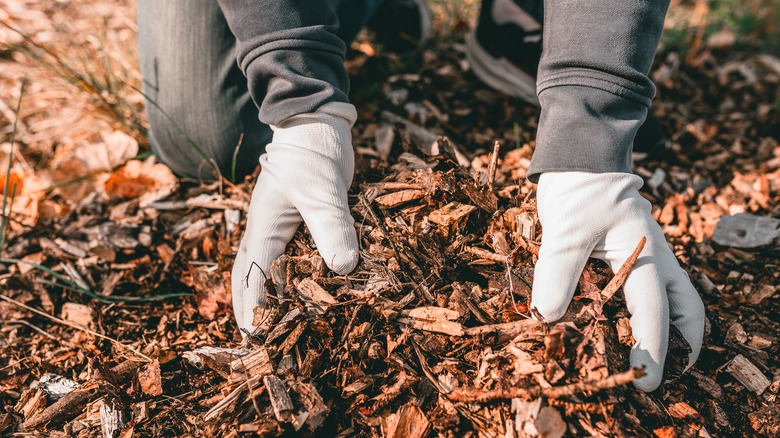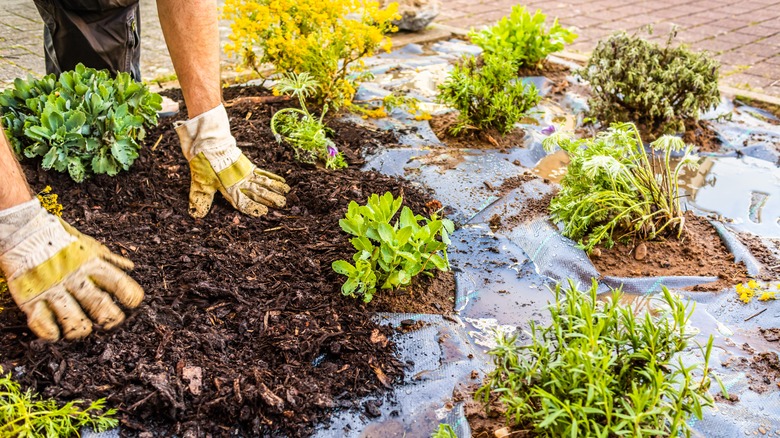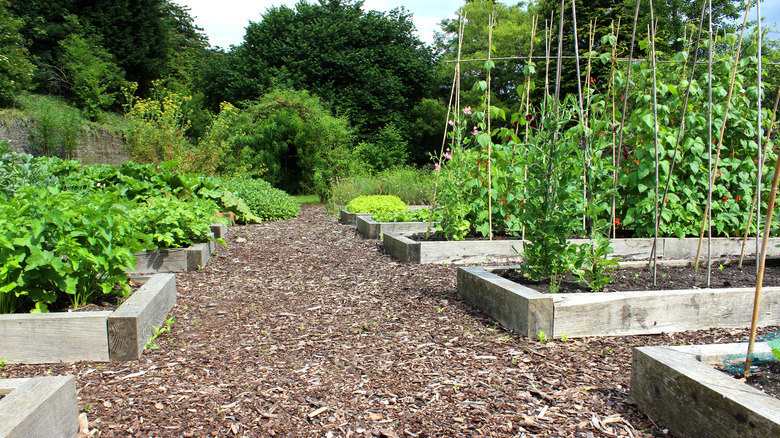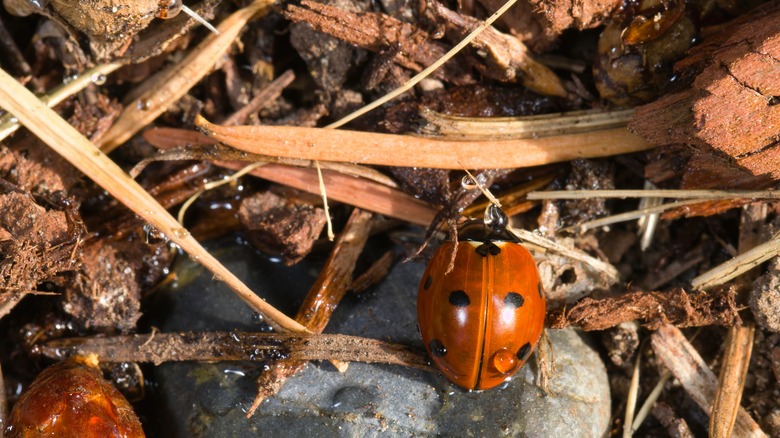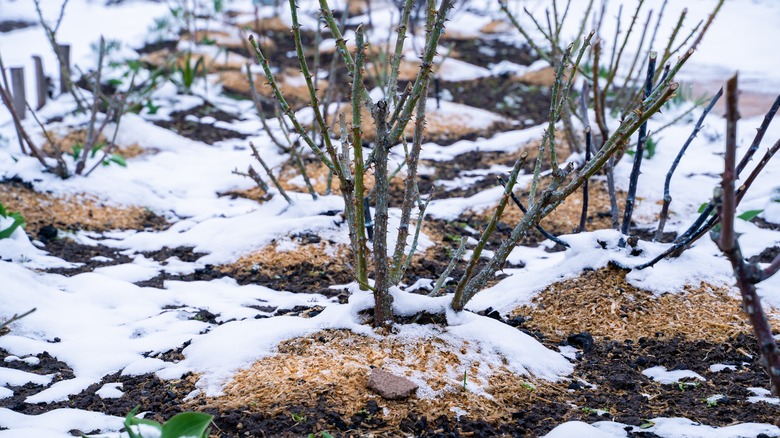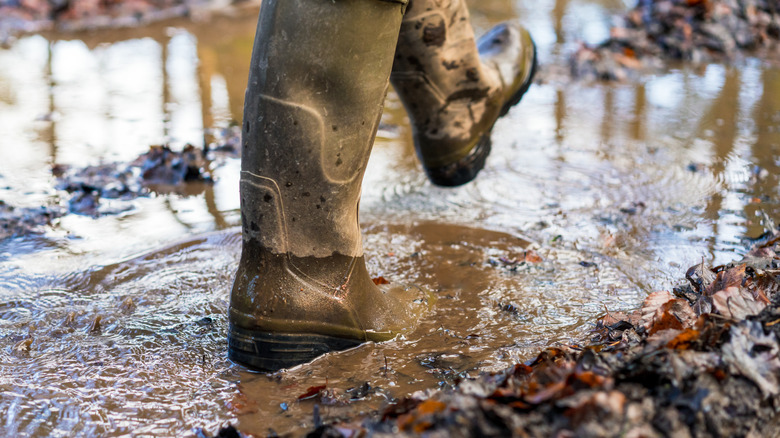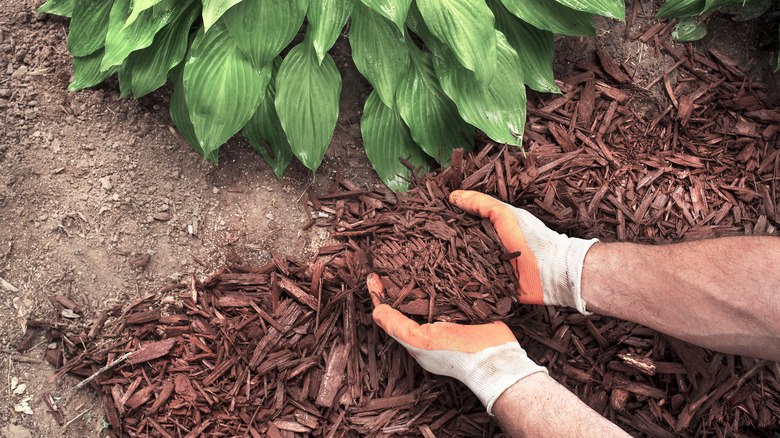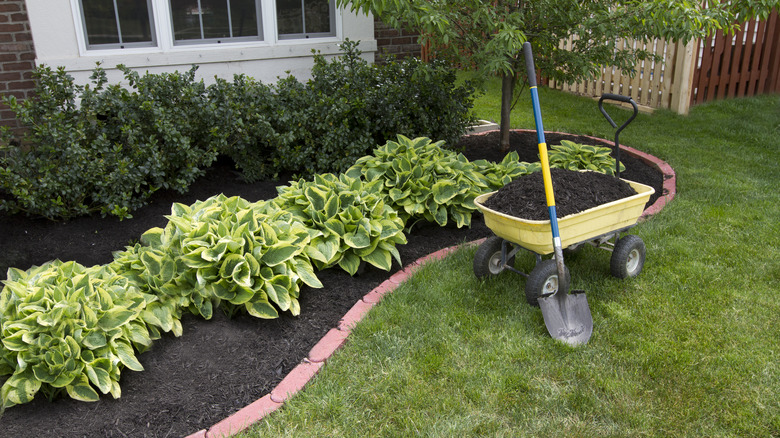All The Ways To Use Mulch In Your Yard And Garden
We may receive a commission on purchases made from links.
Soggy springtime soils, endless summer weeds, frosty fall mornings, and wet winter winds. No matter what time of year it is, mulch can make a massive difference. From organic materials, like grass cuttings and bark chips, to inorganic ones, like gravel, choosing the best type of mulch for your garden depends on your goals and budget. If you have poor soil or don't want to fertilize frequently, you'll need mulch that adds nutrients. When pests are a problem, you may need to spend a little more on insect-resistant mulch. For the best looking landscaping on your block, there are both economical and expensive options out there. Here are all the ways to use mulch in your yard and garden.
For professional landscapers and hobby gardeners alike, mulching is a very simple and beneficial tactic you can use. A true catch-all term, "mulch" refers to any material used to cover the soil. Using organic mulch improves soil in several symbiotic ways. It reduces erosion while conserving water,, and improves soil nutrition as it decomposes. Inorganic mulch offers different benefits. For example, the Garden Weed Barrier Landscape Fabric from Amazon for $19 helps control weeds, shredded rubber mulch makes play spaces safer, and stones add aesthetic appeal.
Use landscape fabric as part of a mulching solution that controls weeds
How to get rid of weeds is a perennial question for most gardeners. Plastic sheeting and landscape fabric are inorganic mulching materials that can do an excellent job of suppressing weeds by acting as a physical barrier, blocking the soil from sunlight. It's also effective at reducing erosion, making it an excellent mulching choice for sloping ground. Use it with caution around plants, because it can leach chemicals into the ground, so it's important to use it for a short period.
Create simple garden paths with organic mulch
Using organic mulch, like wood chips, to create a meandering path through your garden or lawn creates a soft walking surface that works as well for bare feet as it does baby strollers. Along with repelling slugs and snails, organic mulch slowly breaks down into the soil below, enriching it with nutrients that are highly beneficial to the surrounding plants on either side of the path. It also helps the soil retain more water, which can help reduce soggy and pooling areas in your lawn, especially after rainy weather events.
Mulch creates an ideal habitat for beneficial pollinators
Some types of mulch, like leaf litter and compost, can attract good insects into your yard and garden. Earthworms love compost, which provides them with an excellent food source. Bees, butterflies, moths, and other beneficial pollinators love leaf litter, which provides a suitable habitat that protects them from predators, like bats and birds. Leaf litter is plentiful, especially in the fall. But wet leaves can block sunlight from your grass, weakening or even killing it during the winter. To avoid this, make sure to shred leaves before spreading them around the base of your shrubs.
The best types of winter mulch provide air flow for your plants
Cold weather can wreak havoc on even the most established gardens, so it's important to use the right mulch to protect your plants from frost and snow. Mulch helps maintain a warmer soil temperature, insulating even the most shallow rooted bulbs from freezing and thawing their way right out of the ground. Pine needles, hay, or even evergreen boughs are some of the best types of winter mulch, because their looser texture provides better air flow. The Reusable Frost Protection Cloth from Amazon, priced at $23, is another option worth considering.
Mulching creates ideal moisture conditions in your lawn and garden
Do you know what really happens to your garden during periods of excessive rain? It can cause excessive damage. That's why one of the key reasons to use mulch in your garden is that it helps create ideal moisture conditions. When organic mulch, like bark, is worked into soil, it allows water to flow more freely throughout the soil and into plant roots while also improving drainage. During periods of drought, in addition to absorbing moisture from regular watering, mulch creates a barrier layer that reduces evaporation.
Choose cedar mulch to improve soil health and repel pests
Another benefit of using mulch is that it improves overall soil health. Along with removing the effects of pesticides, fertilizers, and heavy metals from your soil, wood mulches can reduce the spread of fungus both within the soil and on your plants themselves. Some wood mulches, like those made of cedar, can also repel harmful pests, including ticks, mosquitos, and fire ants. Large quantities of cedar mulch can be costly, so if you want to repel pests on a budget, consider using the Cedarcide Lawn Granules from Amazon for $47 instead.
Mulch can dramatically improve your home's curb appeal
No matter what kind you use, mulch can drastically improve the appearance of your lawn and garden. Available in a variety of colors and textures, mulch can be used to create defined areas like paths or garden beds, heighten contrast against lush plants, or create strong focal points near hardscape areas. Hay, gravel, or pine straw are low cost options, while cypress, stone, and rubber mulches can cost over $200 per cubic yard. To choose the right kind of mulch, consider your overall budget, coverage area, local climate, and intended purpose.
